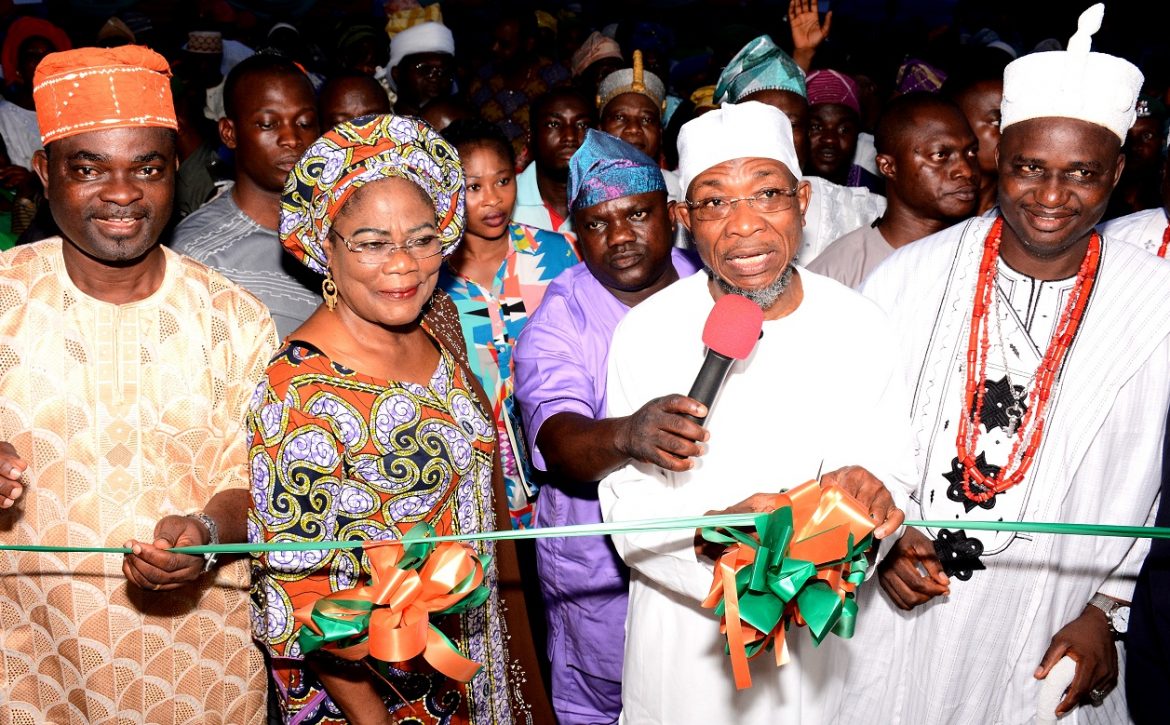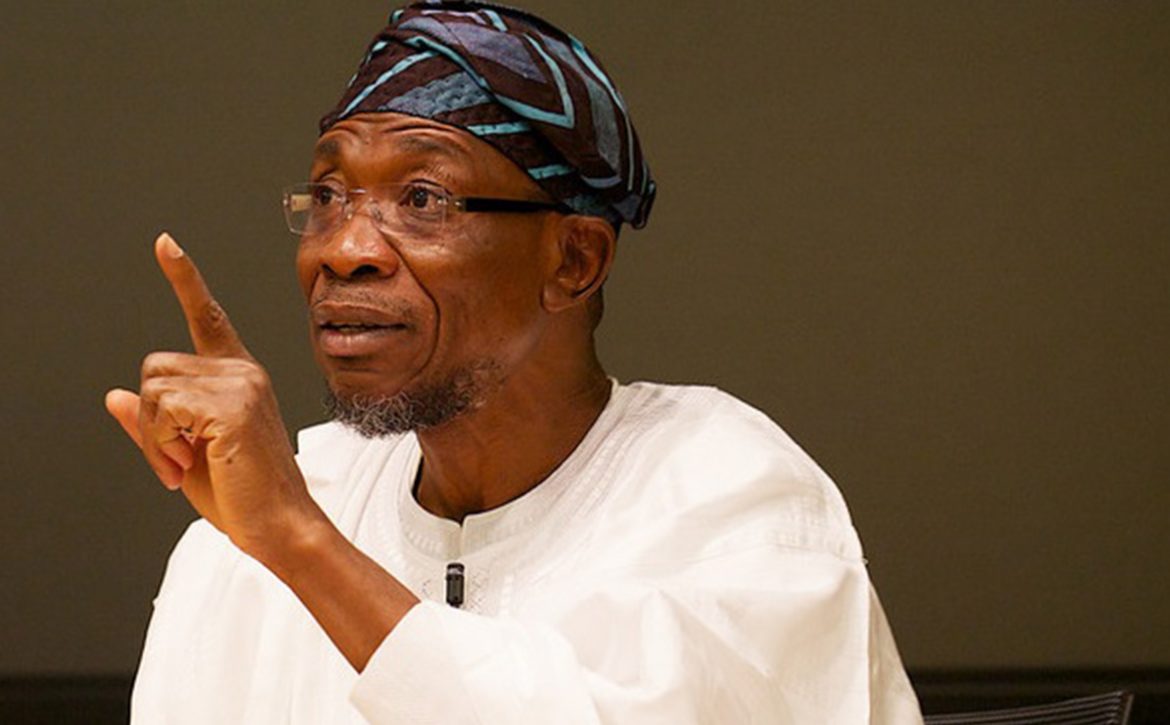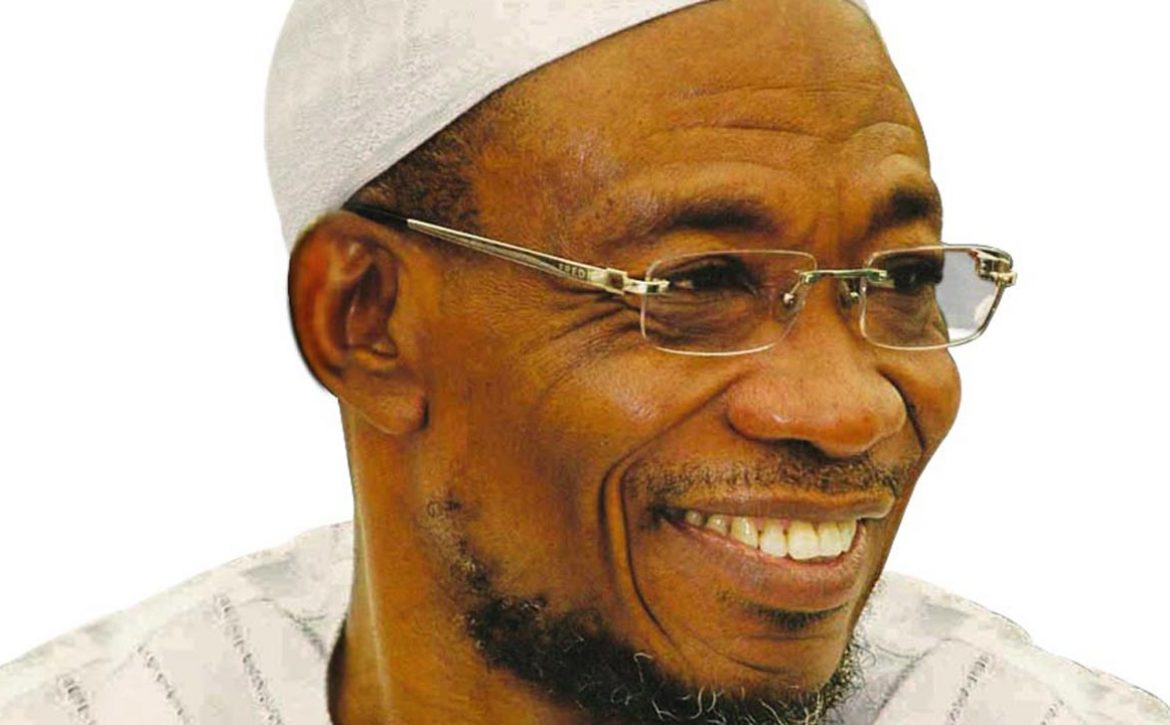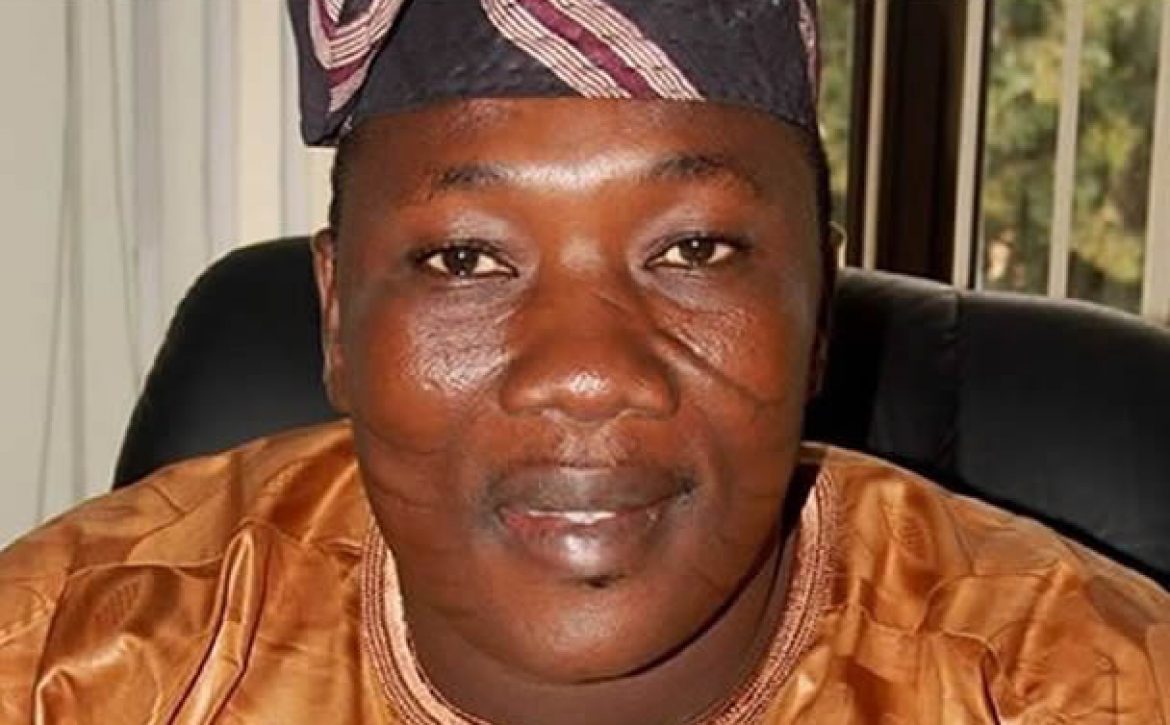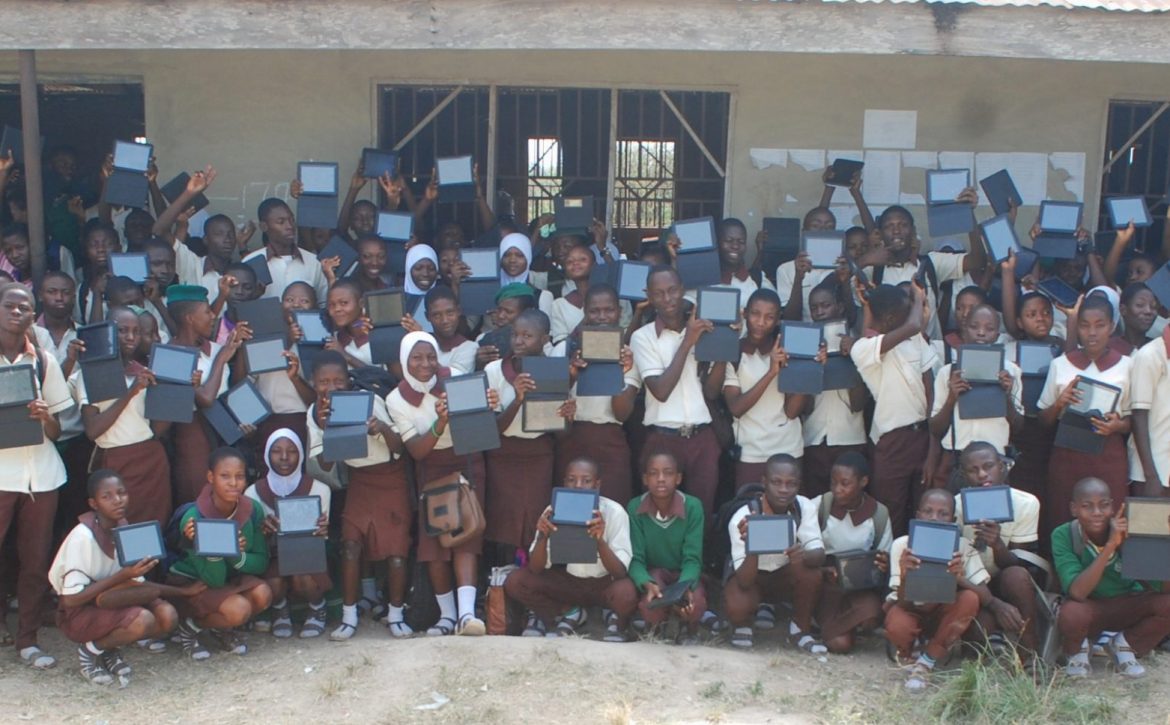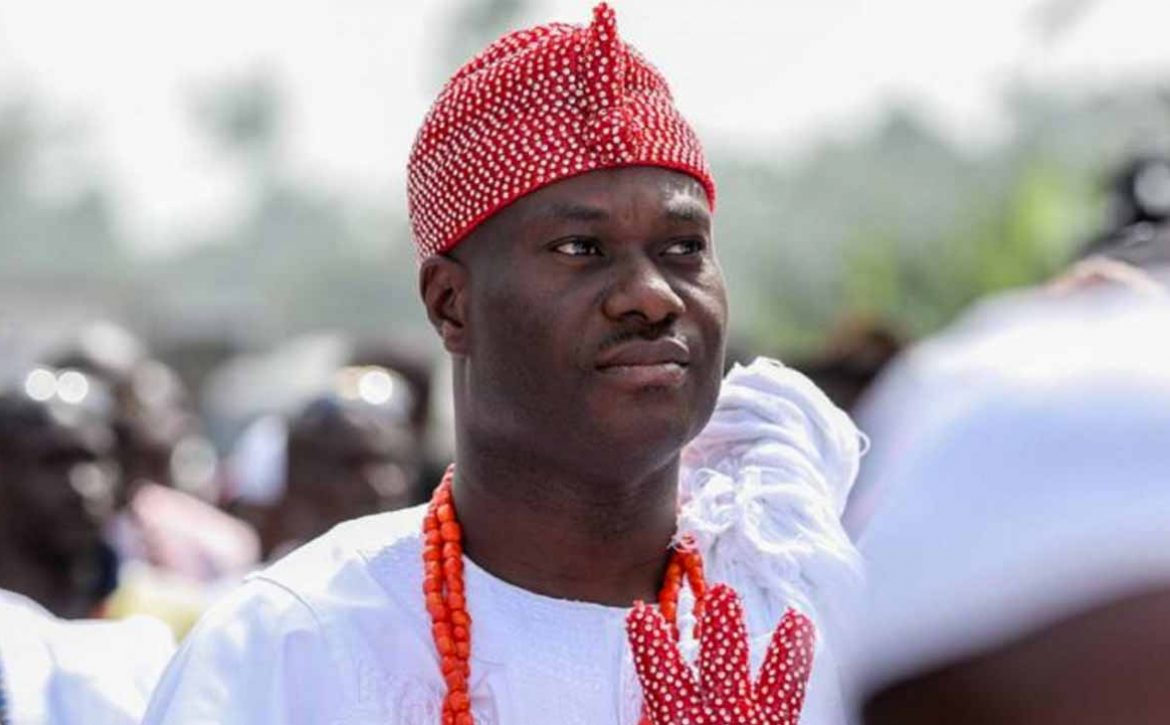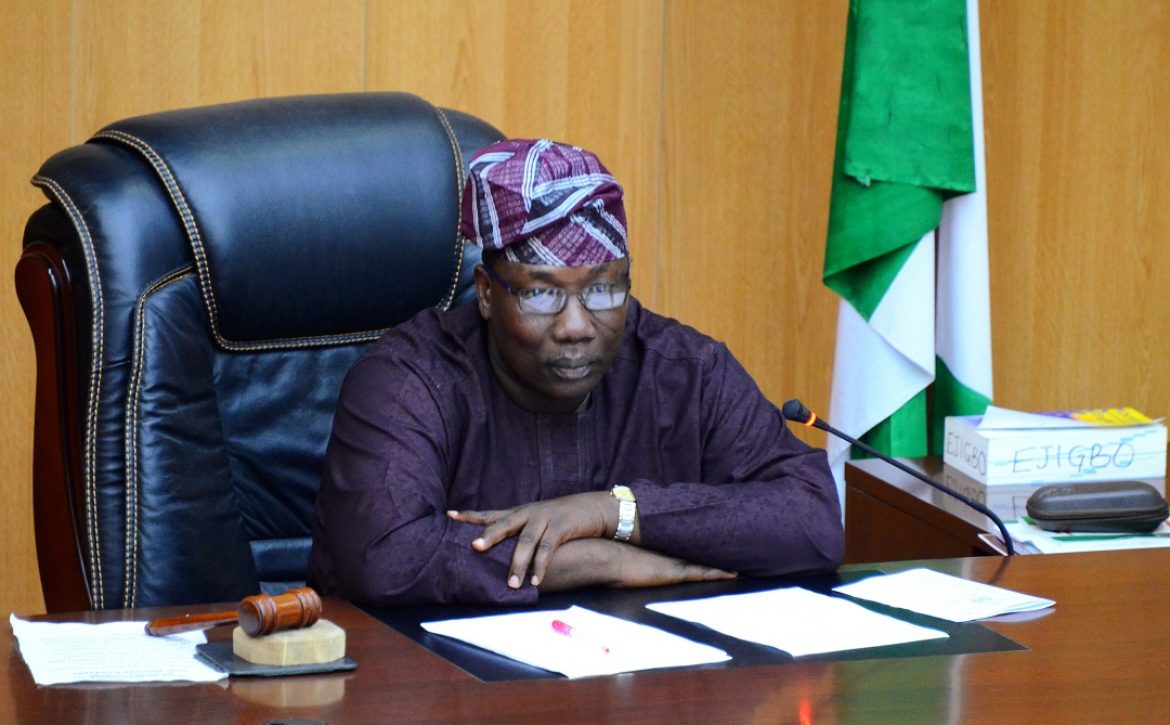The governor of the state of Osun, Ogbeni Rauf Adesoji Aregbesola yesterday commissioned the Oodua 90.0fm radio station in Ile-Ife, Osun state.
Pictures from the colourful event are below

Governor ,State of Osun, Ogbeni Rauf Aregbesola (2nd right), his Deputy, Mrs. Titi Laoye-Tomori (2nd left), Chief Executive Officer, Oodua FM, Hon. Rotimi Makinde (4th left), his Wife, Mrs. Oyebamike Makinde (3rd left), Former Deputy Governor State of Osun, Prince Sooko Adewoyin (left), Southwest Zonal Director, National Broadcasting
Commission (NBC), Mrs. Pauline Ehusani (right) and Father of the Day, Chief Alex Eluyemi (3rd right), at the official commissioning of Oodua 90.9 FM, in Ile-Ife, State of Osun, on Sunday 11/12/2016.

Governor, State of Osun, Ogbeni Rauf Aregbesola (middle), his Deputy, Mrs. Titi Laoye-Tomori (right) and Chief Executive Officer, Oodua FM, Hon. Rotimi Makinde, at the official commissioning of Oodua 90.9 FM,
in Ile-Ife, state of Osun, on Sunday 11/12/2016.

Governor, State of Osun, Ogbeni Rauf Aregbesola (2nd right), his Deputy, Mrs. Titi Laoye-Tomori (2nd left), Chief Executive Officer, Oodua FM, Hon. Rotimi Makinde (left), and Representative of Ooni of Ife and Obalufe of Ile-Ife, Oba Idowu Olaniyi Adediwura, at the official commissioning of Oodua 90.9 FM, in Ile-Ife, state of Osun, on
Sunday 11/12/2016.
Category: General
The Governor of Osun, Ogbeni Rauf Aregbesola on Sunday charged the practitioners and operators of radio stations in the country to be the vanguards of societal values through the promotion of
peace, unity, harmony, love and affection among the people in the society.
He said the time has come for journalists to rededicate themselves and do away with divisive and chaotic tendencies in discharging their duties.

Aregbesola made the statement during the official commissioning of the Oodua Radio Station, in Ile-Ife, Osun state.
The Governor admonished the radio practitioners on the need to champion fairness in discharging their constitutional responsibilities in the society.
He said media practitioners must avoid sensationalism just as they are required to promote accuracy, balance and objectivity.
Aregbesola said radio stations must at this hardship times do all they could to support the government’s efforts in promoting innovative and technology-based ideas to move the nation forward.
Identifying the importance of radio to man’s life, Governor Aregbesola described radio as the best, faster and populous medium of information dissemination.
He condemned in its entirety the way and manner at which some media practitioners have been bastardizing the profession on self-serving interests, saying if not that his government has developed thick flesh, some media practitioners would have succeeded collapsing his government with evil antics and incitement.
Governor also bemoaned over the unprofessional conducts of some radio station’s practitioners and operators, saying “the time has come for journalists to be at the forefront of nation building and do away with subjectivity, favourism and personal emotions.
Commending the owner of the broadcasting station for his productive vision at establishing the station in the state, Aregbesola disclosed that with the establishment of the new station, Osun is now a host to four private radio stations.
He called on the management of the station to always employ precautionary measures in all its activities and not wait until being sanctioned by the National Broadcasting Commission (NBC) before being regulated.
Aregbesola further urged the authority of the station not to allow itself to be hijacked by the disgruntled politicians who according to him, derive pleasures from self-serving interests.
“My advise for the owner and the entire management of this station is to use the medium wisely to promote peaceful coexistence among the people in yorubaland and Nigeria as a whole.
“Please do not politicise your activities in this radio station. Let this establishment be for the promotion of the highest values and ethos of yoruba people.
“Strive to let this station be for the promotion of peace, harmony, love and affection among Nigerians especial yoruba people.
“Shun any divisive tendency and use this station for educational purpose. Use it to promote our culture and balanced entertainment.
“Also, use this station to promote industry, productivity and efficiency as these, will go a long way in rescuing our society from the current recession we are all in.
Aregbesola called on the residents of Ile-Ife and its environs to avoid using the new station to cause violence, crisis and chaos, but rather, they should see it as a medium to further seal peace and unity of Nigerian people.
“The management is further urged to stick to the government’s efforts at advancing innovative, technological and inventive knowledge that have been the hallmarks of our government”, he stressed.
Lamenting on the depleting state of the nation’s economy, Aregbesola hinted media practitioners to design programmes that would quicken the recovery of the nation’s values and socio-economic and democratic loses.
He said media should endeavour in sensitizing public on the current economic predicaments through educative and informative programmes capable of orientating the general public on the need to be productive and take-off their minds from crude oil revenues that have crashed.
The Southwest Zonal Director, National Broadcasting Commission (NBC), Mrs. Pauline Ehusani, called on the management of the new radio station to reflect on their performance the quality of truthful and fair journalism.
She tasked the station on the need to prioritise objectivity, accuracy and correctness, saying radio station must always be a medium of knowledge acquisition.
Ehusani, who represented the Director General of the Commission, implored the management of the station to always act within the constitutional frameworks of their profession and as well avoid anything that can make the station deviate from the NBC’s rules, guidelines and regulations.
“Let fairness and balance be your watchwords as the station starts to perform its roles in educating, informing and orientating the public on the happenings in the world”, she added.
Earlier in his welcome address, the owner of the newly established radio station, Hon. Rotimi Makinde, said the station would be the mouth piece through which the gospel of unity, love, peace and harmony of Nigerian people would be preached.
He promised that the newly commissioned radio station would perform its constitutional roles to re-echo the noble call of peaceful coexistence of the Nigerian people.
Makinde, a former National Assembly member in Ife Federal Constituency, described the commissioning as the birth of a hub of professional unbiased broadcasting in Nigeria.
According to him,”the people of Yoruba kingdom, the state of Osun, the Ifes and its environs as well as the entire Nigerians are today blessed with quality and non-politically motivated broadcasting”.
He promised that the station would do all it could to ensure perfect performance of its responsibilities with quality and effective broadcasting.
He added, “Oodua Fm is open to all to give the general public the required quality broadcasting and let me assure the National Broadcasting Commission that we shall do all our best to conform with the rules and regulations as spelt out by the Nigerian Broadcasting Code.
“Though we are not perfect as human beings, but we shall always bring to you quality, truthful, reliable and fair reporting that will promote the unity of Nigerian people.
“Broadcasting, the breath of Nigerian society, the navigator to Nigerian people, an industry with various talents, a market that only the special voices trade in, and the traders in this very special markets are regarded as “Mirror of the Society”.
“Likewise, since broadcasting industry indeed avail us the window to redirect and inform our populate in many ways, hence it places enormous responsibilities expected on us to encourage this in our society.
He added, “We are open to constructive criticisms and correction, in togetherness we shall positively influence our environment.
Makinde therefore, called on the radio practitioners to come together and make broadcasting more informative, educative and entertaining as the gate keepers.
Meanwhile, the Ooni of Ife, Oba Adeyeye Enitan Ogunwusi who was represented by Obalufe of Ile-Ife, Oba Idowu Olaniyi Adediwura and Father of the Day who doubled as Asiwaju of Ile-Ife, Chief Alex Eluyemi, eulogized the owner of the station (Rotimi Makinde) for his contributions towards human and capital developments in Ifeland.
They described the new radio station as another means of promoting socio-cultural values of yoruba people, saying “the station would avail the people of Ile-Ife, Osun and Nigeria the opportunity to further foster the existing peace and harmony”.
The duo therefore commended Makinde for being committed to all around empowerment programmes.
Governor of the State of Osun, Ogbeni Rauf Aregbesola, has called on Muslims nationwide to have strong conviction that the current economic hardship facing the country will soon fizzle out.
He said it is only with this conviction that the energy of all and sundry could be channeled towards
He urged them to endure for the good of the country and be prayerful.

This was contained in a message sent to adherents of the Islamic faith on the occasion the Eid el- Maolud (birthday of Prophet Muhammad) celebration on Monday.
Aregbesola, in a statement by the Director, Bureau of Communication and Strategy, Mr. Semiu Okanlawon, said what the nation is going through is a lesson for the leaders and the led to act conscientiously.
This was also as he assured the people of Osun that his administration will not leave any abandoned project behind by the end of his tenure.
He admonished Muslims to emulation the humility, good neighbourliness, understanding and love exemplified by the life of Prophet Muhammad.
According to him, Muslims must possess qualities such as commitment, discipline, obedience to and love of Allah, and apply same in their daily relationship to their fellow human beings irrespective of ethnic and religious differences.
He tasked the people of the state to live in peace and extend hands of fellowship to their neighbours so as for the peaceful and tranquil atmosphere the state has been enjoying in the last two years to continue unhindered.
“The time is tough no doubt. Our nation is going through socio-economic hardship but this is just a passing phase. All hands must therefore be on deck for us to move our country forward.
“We must stop paying leap service to fundamental necessities which are catalyst for development in order for our country to take its place in the comity of successful nations,”Aregbesola said
Osun State governor, Rauf Aregbesola, has warned that if proactive measures are not applied by the federal government and the citizenry to tackle the ongoing economic recession, the effects would soon snowball into a civil war scenario.
Aregbesola noted that not only government but Nigerians had a lot of proactive roles to play in mitigating the dehumanising effects of the recession.

Speaking with newsmen in Osogbo, the Osun State capital, the governor also stressed the need to patronise local materials, especially agricultural produce, to boost the country’s export profile in order to strengthen the naira against the dollar.
He opined that it was high time Nigerians resorted to developing more appetite for other staple foods, such as plantains, cassava among others.
“Plantain is even healthier and more nutritious than rice. It is edible in different versions. Why must we keep on pursuing rice? Why can’t we develop plantain and promote it internationally?” Aregbesola asked.
He added that: “The Chinese have realised that the energy required to produce a kilogram of rice is more than the energy that goes into the production of a kilogram of other carbohydrates.
“So, why must we insist on rice as if there are no options?”
He enthused that the school children feeding programme was still ongoing.
“Our school children eat eggs twice in a day. They eat chicken, fish and beef. With each meal, they also eat fruits. We don’t import any of them.
“Women go to our local markets in Osun here and buy them. With this you can be sure that the food sellers no longer suffer as they used to suffer. Indirectly, they are benefitting from government,” he said.
He also explained how his people-oriented social service programmes boosted the economy of the state.
“Whatever money we spend on these food items and other commodities goes directly into the local economy.
“If you move round the state of Osun, you can no longer see the kind of miseries you see in some states due to hardship. Here you hardly see harried and bitter youths in the streets.
“Not less than 20,000 youths have been engaged for public work such as sanitation, traffic control, medical emergencies among others to keep them busy and useful to themselves and the society and we pay them stipends. This has done a lot of wonders here.
“Besides the youths, we also give N10, 000 lifeline monthly to elderly citizens in the state that are vulnerable and in deplorable conditions that can not help themselves. We engage a professor from Obafemi Awolowo University, (OAU), Ile-Ife, who was able to discover them. These are people that are only waiting for death even though their time has not come”, he added.
The Speaker of Osun House of Assembly, Mr Najeem Salaam, has commended the Ooni of Ife, Oba Adeyeye Ogunwusi (Ojaja 11), on his efforts in promoting unity among Yoruba traditional rulers.
The speaker gave the commendation on Thursday in Osogbo in a congratulatory message to mark one year coronation anniversary of the Ooni.

He said the efforts of the monarch in the last one year in promoting oneness and unity among the traditional rulers was commendable.
According to Salaam, Ooni Ogunwusi has shown the world that the Yoruba nation is endowed with rich culture, value and moral fibres, coupled with wise rulers, with the way the great King has conducted himself. The speaker said the House of Assembly under his watch, was proud of the Arole Oodua and his relation with other natural rulers in the state and across the country.
“We, in the Osun House of Assembly are proud of Ooni Ogunwusi and his royal candour in relating with other traditional rulers in the state and across the country, ‘’ said. Salaam, who congratulated the Ooni as he clocked a year on the throne, prayed that the Ooni would live long in good health to attract prosperity.
Governor stateof Osun, Ogbeni Rauf Aregbesola, has expressed disgust at the alarming rate of the current economic recession, lamenting that if proactive measures are not applied by government and the citizenry, the effects would soon degenerate into a civil war scenario.

The governor who stated this in a media chat with Saturday Sun at the weekend, noted that it not only government but Nigerians had a lot of proactive roles to play in mitigating the dehumanising effects of the recession.
While suggesting strategies the citizenry at all levels could adopt in surviving the period, the governor expressed the need for people to cut down on luxuries and make do with whatever is available within the limit of their income.
Aregbesola also stressed the need to patronise local materials, especially agricultural produce, to boost the country’s export profile in order to strengthen the naira against the dollar.
According to him, there is no need for people to insist on eating rice, which has become too expensive even though some people cannot afford it.
He noted that even the people of China, who are the largest producer of rice, have stopped depending largely on rice.
Aregbesola said it was high time people resort to developing more appetite for other staple foods, such as plantains, cassava among others. “Plantain is even healthier and more nutritious than rice. It is edible in different versions. Why must we keep on pursuing rice?” Why can’t we develop plantain and promote it internationally? Aregbesola asked.
The Chinese have realised that the energy required to produce a kilogram of rice is more than the energy that goes into the production of a kilogram of other carbohydrates.
“So, why must we insist on rice as if there are no options?”
The governor also spoke glowingly on the various strategies his administration has adopted to help the people of the state, especially the school children, the youth among others survive the recession.
He enthused that the school children feeding programme was still ongoing.
“Our school children eat eggs twice in a day. They eat chicken, fish and beef. With each meal, they also eat fruits. We don’t import any of them. Women go to our local markets in Osun here and buy them. With this you can be sure that the food sellers no longer suffer as they used to suffer. Indirectly, they are benefitting from government,” he said.
He also explained how his people-oriented social service programmes boost the economy of the state.
“Whatever money we spend on these food items and other commodities goes directly into the local economy,” he added.
He added: “If you move round the state of Osun, you can no longer see the kind of miseries you see in some states due to hardship. Here you hardly see harried and bitter youths in the streets. Not less than 20,000 youths have been engaged for public work such as sanitation, traffic control, medical emergencies among others to keep them busy and useful to themselves and the society and we pay them stipends. This has done a lot of wonders here.
“Besides the youths, we also give N10, 000 lifeline monthly to elderly citizens in the state that are vulnerable and in deplorable conditions that can not help themselves. We engage a professor from Obafemi Awolowo University, (OAU), Ile-Ife, who was able to discover them. These are people that are only waiting for death even though their time has not come.”

Grade 12 class of Ataoja Government High School of Science, Osogbo with their Principal, Mrs Taiwo Adeagbo displaying the ‘Opon-Imo’ – Tablet of Knowledge given to them by the government of Ogbeni Rauf Aregbesola at the school hall, Osogbo on Friday 09-12-2016

Grade Level 12 Students of Ataoja Government High School of Science, Osogbo comparing and contrasting their ‘Opon-Imo’ – Tablet of Knowledge given to them free of charge by the government of Ogbeni Rauf Aregbesola at the school hall, Osogbo, on Friday 09-12-2016

Grade Level 12 Students of Ataoja Government High School of Science, Osogbo (on queue) waiting to sign for their ‘Opon-Imo’ – Tablet of Knowledge given to them free by the government of Ogbeni Rauf Aregbesola at the school hall, Osogbo, on Friday 09-12-2016

Speaker of the Osun State House of Assembly, Najeem Salaam, has lauded the Ooni of Ife, Oba Adeyeye Ogunwusi (Ojaja II) for picking the gauntlet against divisive tendencies among the Yoruba traditional rulers in the last one year of his ascension to the throne.

Speaking to newsmen in his office at the House of Assembly complex in Osogbo, the state capital, Speaker Salaam asserted that Ooni Ogunwusi has shown the world that the Yoruba nation is endowed with rich culture, value and moral fibers coupled with wise rulers, with the way the King has conducted himself.
Speaker Salaam stressed that the state parliament under his watch was proud of the Arole Oodua and his relation with other traditional rulers in the state and across the country.
“We, at the State of Osun House of Assembly are proud of Ooni Ogunwusi and his royal candor in relating with other traditional rulers in the state and across the country.
“We cannot but agree more to his world view on unity and the leaders across board for the good of the nation”, Salaam reiterated.
“I congratulate the great monarch as he clocks a year on the revered stool and pray that Ooni Ogunwusi would live long in good health to attract prosperity.
“He has been of great encouragement to youths in Ile-Ife and beyond, particularly in his drive towards reducing unemployment among the youths,
“He has shown that the youths can still go back to the farm and make their life worthwhile. In many ways he has rehabilitated many youths who have gone astray and has given them a new approach to life.
“What more can the people of Ile-Ife ask for? What more can Osun state ask for and what more can the Yoruba race ask for?
“Here is a king who understands what it means to unite the Yoruba race. We are so proud of his reign and we believe God will always be with our king.
Recipient banks of the bailout fund given to Osun State government yesterday said the fund was strictly used to pay salary arrears, allowances and pensions, in line with the Central Bank of Nigeria’s (CBN’s) guidelines.
Representatives of First Bank of Nigeria (FBN), Wema Bank and Zenith Bank, spoke during a presentation to the House of Assembly in Osogbo, on how the concessionary loan was disbursed.
The Assembly directed the banks, some government officials and organisations, to appear before it over how the N34.9 billion bailout fund was spent.
In their presentation, the banks said: “We ensured that due diligence was followed. We can confirm that we followed the CBN guidelines in the way and manner the loan was disbursed.
“It was used for the purpose it was meant – payment of salary arrears, allowances and pensions.
“Also, the figures shown in a slide by the Accountant General and Permanent Secretary, Local Government Affairs, were correct, so also are the balance figures in the banks.”
The Accountant General said the bailout was judiciously administered by the government without any underhand dealings.
According to him, the amount requested, which covered salary arrears, allowances and pensions, was N64, 327, 492, 947.01.
He stated that the state was however given, N25, 887, 975, 810.26, an amount, which did not include the pension arrears.
Kolawole said the pensioners were thus not captured in the bailout fund, saying Governor Rauf Aregbesola mandated that pension should be included in the disbursement.
He said: “On July 15, 2015 we requested for N64.3 billion to take care of all salary arrears, allowances and pension. But we were given N25, 887, 975, 810.26.
“No fund was released for pension and gratuity despite the fact that we included it in our letter to the CBN.
“ICPC called me to a meeting where I gave them all the documents containing the transactions. When ICPC did not return, I believe it was satisfied with the information. The EFCC did not invite me.”
The Permanent Secretary, Local Government Affairs, Mr. Muftau Oluwadare, in his presentation, said N23, 887, 975, 810.26 was requested from the CBN but N9, 117, 070, 000 was given to them.
According to him, it was this and that of the state that totaled N34 billion released to both state and local government.
He said the fund was also used as it was directed by the CBN to pay salaries of local government workers, primary school teachers and pension arrears.
Speaker of the House, Hon. Najeem Salam lauded the finance team for the clear presentation and the banks for their due diligence in the disbursement process.
Salam said it was not true the insinuations that the House was gingered to investigate the bailout fund based on the letter written by the Senate to investigate how the bailout fund was spent.
“We have been monitoring the activities of the executive on how the bailout and other loans are being spent.



